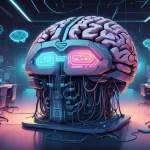China’s AI Surge Threatens U.S. Tech Dominance and Crypto Decentralization

China’s AI Ascent: A Threat to U.S. Tech Giants and the Future of Decentralized Tech
China’s meteoric rise in artificial intelligence (AI) is sending shockwaves through the tech world, with implications that could reshape not just Silicon Valley but the very foundation of decentralized technologies like Bitcoin and blockchain. John Pearce, Chief Investment Officer at UniSuper, an Australian pension fund overseeing A$158 billion ($104 billion), issued a stark warning at the Bloomberg Forum for Investment Management in Sydney: China’s cheaper, increasingly powerful AI tools could dismantle the business models of U.S. titans like Microsoft, Nvidia, and Apple, each valued at over $4 trillion.
- China’s AI Advantage: Low-cost, high-quality AI tools threaten U.S. tech dominance.
- Research Power Shift: Chinese scientists lead nearly half of U.S.-China collaborative projects.
- Crypto Crossroads: AI innovation could reshape Bitcoin and blockchain, for better or worse.
China’s Cost Edge: A Game-Changer for Tech and Beyond
Pearce didn’t hold back when addressing the competitive threat posed by China’s advancements in AI, particularly in the development of large language models (LLMs). For the uninitiated, LLMs are the engines behind modern AI systems—think of them as massive algorithms trained on enormous datasets to understand and generate human-like text, code, or even complex problem-solving outputs. They power everything from chatbots like ChatGPT to automated customer service tools and advanced data analysis platforms. What’s alarming is China’s ability to build these systems at a fraction of the cost of their American counterparts while delivering comparable results, as highlighted by UniSuper’s CIO in his warning about China surpassing U.S. tech giants.
“If they’re developing their LLMs and doing it much, much cheaper than the Americans and still giving the same output, well that’s going to put a big question mark on your business model,” Pearce warned.
This cost advantage isn’t just a minor inconvenience; it’s a potential death knell for the inflated valuations of U.S. tech giants. If investors start doubting the sustainability of these $4 trillion market caps, we could see a sell-off reminiscent of the dot-com crash of the early 2000s. Pearce even coined the term “DeepSeek moments” to describe sudden, disruptive breakthroughs from Chinese AI that could catch Western firms off guard. Picture it as a tech earthquake—a rapid shift that reshapes entire industries overnight without warning.
But why should Bitcoin enthusiasts or blockchain advocates care about this high-stakes tech rivalry? Simple: AI isn’t just about chatbots or search engines. It’s increasingly integral to the evolution of decentralized systems. From optimizing Bitcoin mining operations through predictive energy algorithms to enhancing Ethereum’s smart contracts with real-time fraud detection, AI holds the potential to turbocharge the efficiency and scalability of crypto networks. The question is, who controls this tech? If China’s AI surge outpaces the U.S., will the innovations prioritize the open, permissionless ethos of Bitcoin, or will they bend toward state-driven, centralized frameworks that undermine everything we stand for?
Nvidia’s High Stakes and the Call for Strategic Finesse
At the heart of this AI arms race is Nvidia, a leading U.S. company specializing in the chips that power much of the world’s AI infrastructure. CEO Jensen Huang recently projected that their latest chips could generate up to half a trillion dollars in sales, a staggering figure that underscores the financial stakes at play. Yet, Huang is acutely aware of the geopolitical tightrope the U.S. must walk. Amid escalating trade tensions with China, including export controls on advanced tech, he’s calling for a calculated approach to policy that doesn’t alienate half the world’s developers or lock American firms out of the massive Chinese market.
“The policy that causes America to lose half of the world’s developers is not beneficial long-term,” Huang cautioned.
He also emphasized the inherent value of American technology when it’s operating at peak performance, a not-so-subtle jab at the idea that the U.S. still holds a quality edge—if it can maintain access and talent.
“Their industries would like to be as productive as possible. American technology is the best, and when it’s the best, it’s also the most affordable,” Huang added.
For the crypto space, Nvidia’s role is pivotal. Their GPUs are the backbone of Bitcoin mining operations worldwide, and any disruption in their market dominance—whether through Chinese competition or misguided U.S. policy—could ripple through to mining profitability and network security. If China develops comparable chips at lower costs, miners might pivot en masse, shifting the geographic balance of Bitcoin’s hash rate. That’s not just a business concern; it’s a potential vulnerability for a network that thrives on decentralization.
Research Dominance: China’s Brain Trust vs. U.S. Brain Drain
The competition extends far beyond corporate boardrooms into the realm of scientific research, where China is making seismic gains. A study published in the Proceedings of the National Academy of Sciences reveals that in 2023, Chinese scientists led 45% of collaborative research projects with the U.S., up from just 30% in 2010. Experts predict full parity by 2027-2028. This isn’t a fluke—it’s the result of deliberate, state-backed investment. Since 2012, China has funneled over 33 billion yuan ($4.7 billion) into educating international students from Africa and South Asia through the Belt and Road Initiative, a global program designed to build infrastructure and influence. This isn’t charity; it’s a strategic play to cultivate a worldwide talent pipeline feeding directly into China’s tech ambitions.
Meanwhile, the U.S. is shooting itself in the foot. During Donald Trump’s administration, savage funding cuts and layoffs at federal science agencies triggered an exodus of American researchers. Countries like Canada and Denmark capitalized on this, launching programs to attract displaced talent. According to the U.S. National Science Foundation, China is on track to achieve leadership parity in 8 of 11 critical technology sectors—including AI, semiconductors, and materials science—before 2030. This brain drain is a serious blow to U.S. innovation at a time when it can least afford it.
For blockchain and crypto, this research shift is a double-edged sword. On one hand, a surge in global AI talent could accelerate breakthroughs in decentralized tech—think AI-driven consensus mechanisms that make Bitcoin transactions faster or privacy protocols for coins like Monero more robust. On the other, China’s state-heavy approach to research raises red flags. If their scientists dominate AI development, will the resulting tech prioritize open systems, or will it embed surveillance and control mechanisms akin to their social credit systems? That’s a trillion-dollar question for anyone who believes in Bitcoin as a bastion of financial freedom.
AI and Blockchain: Innovation Boon or Centralization Trap?
Let’s drill down into how AI could directly impact the crypto world. Bitcoin mining, for instance, is an energy-intensive beast. AI algorithms could predict optimal mining times based on electricity costs or renewable energy availability, slashing operational expenses and making smaller miners more competitive. On Ethereum’s turf, AI could revolutionize decentralized finance (DeFi) by powering smart contracts with real-time data analysis—imagine automated lending protocols that detect market manipulation before it happens. Even privacy coins like Monero could benefit from AI-enhanced anonymization techniques to stay ahead of government tracking efforts.
But here’s the flip side: AI isn’t inherently neutral. If developed under state influence, it could become a tool for centralization rather than liberation. China’s track record on data privacy—think mass surveillance and social credit scoring—suggests that their AI might prioritize control over freedom. Could we see blockchain protocols laced with backdoors or monitoring capabilities if Chinese tech sets the standard? It’s not far-fetched. And let’s not kid ourselves—U.S. tech giants aren’t saints either. Their cozy relationships with government agencies could just as easily turn AI into a weapon against crypto’s anonymity if they feel threatened by decentralized finance.
As a Bitcoin maximalist at heart, I’ll always argue that BTC’s simplicity and security make it the bedrock of this financial revolution. But I can’t ignore that altcoins like Ethereum fill critical niches with their programmable smart contracts, which stand to gain even more from AI integration. The risk, though, is universal: whoever leads AI could dictate the future of blockchain. If that leader values control over freedom, we’re in for a rough ride.
Playing Devil’s Advocate: Is the Threat Overblown?
Let’s take a step back and poke at the narrative. Are we overhyping China’s threat to U.S. tech dominance? After all, American companies like Nvidia still hold a quality edge in many areas, and their valuations—while lofty—reflect decades of innovation and market trust. Could China’s state-driven model actually backfire, producing AI that’s cheap but plagued by ethical issues or reliability gaps? And here’s a wild thought: what if their cost advantage democratizes AI access for indie developers globally, indirectly boosting open-source blockchain projects? It’s not impossible.
On the U.S. side, policy missteps are real, but let’s not underestimate the resilience of American innovation. The open-source ethos that birthed Bitcoin came from the same DIY spirit that still thrives in U.S. tech hubs. If Washington gets its act together, could a renewed focus on research funding and developer retention turn the tide? Historical tech races, like the internet boom of the ‘90s, show that competition often sparks the best ideas—sometimes even crossing borders. Maybe this rivalry is the kick in the pants crypto needs to evolve faster.
Still, I’m not holding my breath for a fairytale ending. The stakes are sky-high, and complacency isn’t an option. If a so-called “DeepSeek moment” hits and China’s AI outstrips Silicon Valley’s, it won’t just be Wall Street trembling—it’ll be the entire decentralized dream hanging by a thread. Will Bitcoin’s fight for freedom survive a world where tech power consolidates under state control? That’s the question keeping me up at night.
Key Takeaways: Unpacking the U.S.-China AI Rivalry for Crypto Enthusiasts
- What threat does China’s AI surge pose to U.S. tech giants and the crypto space?
China’s development of low-cost, high-quality AI tools, like large language models, could disrupt giants like Microsoft and Nvidia, risking market instability. For crypto, this raises concerns about who controls AI-driven blockchain advancements, potentially threatening decentralization. - How is China overtaking the U.S. in tech research, and what’s the impact on blockchain?
Chinese scientists lead 45% of U.S.-China collaborative projects, fueled by initiatives like the Belt and Road’s 33 billion yuan investment in global talent. This could speed up blockchain innovation but risks embedding state control over decentralized systems. - What internal U.S. challenges threaten its tech and crypto leadership?
Funding cuts under Trump’s administration pushed researchers abroad to nations like Canada, weakening U.S. innovation. This slowdown could delay AI integration into Bitcoin and blockchain, ceding ground to competitors. - How does Nvidia’s CEO view U.S.-China tensions and their broader tech implications?
Jensen Huang advocates for U.S. policies that retain global developers and access to markets like China, warning that isolation could cripple long-term innovation, including in blockchain-adjacent fields like AI chip development. - Could China’s AI dominance reshape decentralized tech like Bitcoin and Ethereum?
Absolutely. AI could enhance Bitcoin mining efficiency and Ethereum’s DeFi protocols, but if China leads, state-friendly frameworks might clash with crypto’s ethos of freedom and privacy, risking centralization.



